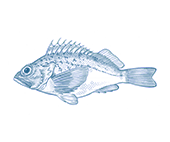




- Say No
Wild Caught
Region:
TAS
- Southern calamari is a fast growing, short-lived and quick to reproduce species. They are primarily caught using jig fishing methods in Tasmania.
- The fishery has been subject to severe overfishing and localised depletion has been detected in key areas.
- The jig fishing method used to catch most squid in Tasmania has minimal impacts on marine habitats or other species.
- Tasmanian waters are warming at four times the global average. It is crucial that fisheries continually improve environmental performance standards to build resilience against climate change.
- TAS Scalefish Fishery (84t in 2022/23, 107t in 2018/19)
Southern calamari is a fast growing, short-lived (around 12 months) species that reproduces quickly and produces a high number of offspring. This makes them highly resilient to fishing pressure. Undertaking formal stock assessments (scientific assessments of the numbers of a species) of squid species is generally difficult for fishery managers, as reproduction is highly variable depending on environmental conditions.
Despite their resilience, Tasmanian populations of southern calamari have been subject to severe overfishing.
A recent government scientific assessment found that catches in recent years exceeded sustainable levels. In the north of Tasmania, catches had been more than double the maximum sustainable level.
Management measures are failing to produce state-wide recovery.
The reduction of fishing pressure on the southern and eastern region appears to be allowing populations to begin recovering, though this will be slow.
Squid are an important predator whose exploitation could negatively affect the ecosystem and community structure. Given that total catches of southern calamari have risen since 2012/13, and that the effort has shifted to the north coast, it is likely the overall environmental risk has increased. This needs to be better understood in the Tasmanian fishing grounds where squid are targeted.
Most southern calamari are caught in Tasmania using jig fishing methods, which do not impact seafloor habitats and have little or no catch of any other species.
There has been investment by managers in understanding climate change impacts on key Scalefish Fishery species, which is welcome. But there do not yet appear to be strategies for managing fishing impacts in Tasmania’s rapidly changing ocean climate.


